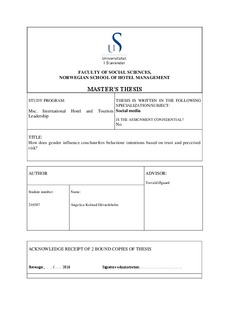| dc.contributor.advisor | Øgaard, Torvald | |
| dc.contributor.author | Håvardsholm, Angelica Kolstad | |
| dc.date.accessioned | 2016-10-10T08:57:21Z | |
| dc.date.available | 2016-10-10T08:57:21Z | |
| dc.date.issued | 2016-06 | |
| dc.identifier.uri | http://hdl.handle.net/11250/2413810 | |
| dc.description | Master's thesis in International Hospitality Management | nb_NO |
| dc.description.abstract | Social media has become a major and important factor in today’s society. In the tourism and hospitality industry, social media has created new platforms for communications. An online social network within the travel community is Couchsurfing.com. Couchsurfing allows travelers all over the world to do a hospitality exchange. On Couchsurfing.com people open their homes for strangers to stay the night. Since couchsurfing is based on online communication in order to meet face-to-face, questions of perceived risk and trustworthiness can be raised. Based on this, the main issue of this thesis is: How does gender influence couchsurfers behavioural intentions based on trust and perceived risk? This thesis consists of a combination between explorative and descriptive design in order to get an overall view on the issue. There were performed a group interview with couchsurfers in order to define key objectives. This was used to develop an experiment with the most important indicators of trustworthiness. The experiment was conducted with a survey including 250 students at the University of Stavanger and Randaberg upper secondary school, Norway.The survey were also shared on social media. In the experiment the respondents were divided into different groups. These groups consisted of gender of the host and coachsurfer and travelling alone or with a friend. Each group had ordinary or manipulated references. The main aim of the thesis was to see how the independent variables had an effect on the constructs trust, percieved risk and behavior intention of the couchsurfer. Unfortunately, this study’s findings were not significant to state any new theories or contribute an overall understanding of trust, perceived risk and behavior intentions within couchsurfers. However, recommendations for further studies in the field could be interesting. The suggested recommendations include further studies with a conscious choice of respondents done couchsurfing. The survey showed multiple respondents were not able to adapt towards the role of the couchsurfer. This might explain why there were small differences between the different groups, which might had an impact on the non-significant findings. It could be interesting to see which target group who use couchsurfing and their motivations for choosing this untraditional travel approach. Another interesting aspect could be to explore the variables within age, cultural differences and relationship status. Keywords: Couchsurfing, social media, gender, trust, perceived risk. | nb_NO |
| dc.language.iso | eng | nb_NO |
| dc.publisher | University of Stavanger, Norway | nb_NO |
| dc.relation.ispartofseries | Masteroppgave/UIS-SV-NHS/2016; | |
| dc.rights | Navngivelse 3.0 Norge | * |
| dc.rights.uri | http://creativecommons.org/licenses/by/3.0/no/ | * |
| dc.subject | reiselivsadministrasjon | nb_NO |
| dc.subject | hotelladministrasjon | nb_NO |
| dc.subject | couch surfing | nb_NO |
| dc.subject | gender | nb_NO |
| dc.subject | social media | nb_NO |
| dc.subject | sosiale medier | nb_NO |
| dc.subject | kjønn | nb_NO |
| dc.subject | perceived risk | nb_NO |
| dc.title | How does gender influence couchsurfers behaviour intentions based on trust and perceived risk? | nb_NO |
| dc.type | Master thesis | nb_NO |
| dc.subject.nsi | VDP::Social science: 200::Economics: 210::Business: 213 | nb_NO |

